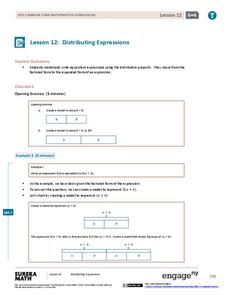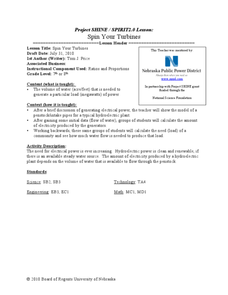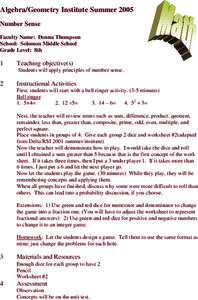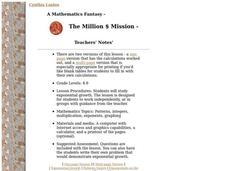EngageNY
Factoring Expressions
Factor in an informative resource when teaching about factoring. The 11th lesson in a 36-part module shows pupils how to factor algebraic expressions by applying the distributive property. Some of the problems involve expressions with...
EngageNY
Distributing Expressions
You know how to factor expressions; now it's time to go the opposite way. Scholars learn to write algebraic expressions in expanded form using the distributive property. A problem set helps them practice the skill.
Curated OER
Using Square Tiles to Investigate Numbers
Fifth graders model and distinguish between prime and composite numbers. Students are paired up with another classmate to complete this instructional activity. Students are assigned different numbers to work with, they use square tiles...
Curated OER
Balancing the Scales: Understanding Ratios
Students are introduced to the concept of ratios. In groups, they convert sets of numbers into a ratio. After practicing, they use the ratios and proportions to solve story problems. They also calculate map distances and discover map...
EngageNY
Comparing Linear Functions and Graphs
How can you compare linear functions? The seventh installment of a 12-part module teaches learners how to compare linear functions whose representations are given in different ways. They use real-world functions and interpret features in...
EngageNY
The Long Division Algorithm
Two methods are always better than one! The eighth installment in this series asks pupils to convert decimals to fractions using two approaches. Individuals first use the more traditional approach of long division and then use reverse...
Curated OER
Prime and Composite Numbers
Sixth graders identify prime and composite numbers and complete an activity problem. Given a 100 chart, they follow directions to create a prime number chart. In groups, 6th graders play a "Prime Take Away" activity to reinforce prime...
Curated OER
Order of Operations and Simplify
Eighth graders investigate a lesson using the Order of Operations. The lesson has good instructions to carry out the lesson. The language is user-friendly for the average educator. They also use a Math writing journal to integrate...
Curated OER
Spin Your Turbines
Students relate electrical power and how it works to math. In this geometry lesson, students analyze how a hydroelectric plant works and calculate the amount of electricity that is produced by a typical generator. This lesson uses...
Curated OER
Exponential Functions
Analyze functions by their shape and equation and identify decay and growth based on the equation given. Learners graph their exponential functions and differentiate it using the logarithmic versus the exponential function.
EngageNY
Applications of the Pythagorean Theorem
Begin seeing the world through the lens of geometry! Use the 19th installment in a 25-part module to apply the Pythagorean Theorem to solve real-world problems. Individuals sketch situations resulting in right triangles such as the...
Curated OER
Classroom Comparison of Fat Intake
Students bring in their fat diaries and work in pairs to calculate their average fat intake per day during the week of data collection. The whole class gathers to calculate their total fat intake and average fat intake per student per...
Curated OER
Place Value for Whole Numbers
Fourth graders, in groups, explore place value for whole numbers. They explore how to use base-ten materials to make sense of place value in the tens and ones column. They also explore whole-number patterns by using base-ten materials.
Curated OER
Number Sense
Eighth graders participate in a lesson that is concerned with reviewing basic math concepts using the four operations. The activity is composed of a math game that is played by them.
Curated OER
Roping Quadrilaterals
Students explore with quadrilaterals. In this roping quadrilaterals lesson plan, students work in cooperative groups to play the game, "Question, please!" in order to identify, describe, compare and classify quadrilaterals. Students...
Curated OER
Division
Students use their knowledge of multiplication to learn problem solving strategies to solve division problems. In this division lesson plan, students play a circle game, work in small groups to review times tables, and solve division sums.
Curated OER
Fraction Reaction
Students review how to solve problems with fractions. In groups, they participate in a card game in which they identify the fraction and its equivalent. They also complete a worksheet related to fractions and have a partner check their...
Curated OER
Skittle Around with Fraction and Percentages
Fifth graders investigate the interchangeable relationship betweeen fractions and percents. They discuss the concepts using teacher provided questions. Then sutdents work in cooperative groups to maximize scaffolding.
Curated OER
Line Symmetry
Students investigate the concept of line symmetry and how to recognize it in different contexts. They record the number of symmetries when given problems to work on in class. They review the concept of congruence and how it relates to...
Curated OER
Solve Me-One and Two-Step Inequalities
Young scholars solve one and two-step inequalities. In this Algebra I activity, students solve inequalities using paper and pencil and use the TI-nspire CAS to check each steps in their work. Additionally, the solve feature will be...
Curated OER
The Million $ Mission
Students study exponential growth. The instructional activity is designed for students to work independently, or in groups with guidance from the teacher.
Curated OER
Prime and Composite Numbers
Fifth graders use prime factorization to identify prime and composite numbers. They use cubes to find factors. In groups, 5th graders draw rectangular arrays to discover prime numbers under 100.
Curated OER
Lesson Plan 3: Inequalities
Ninth graders study inequalities. After a teacher demonstration, classmates solve and graph inequality problems. In groups, they are assigned specific tasks that lead to the solving of inequality word problems.
Curated OER
Area and Perimeter
Eighth graders practice solving real life situations involving area and perimeter. In groups, they are given specific roles in determining the layout of a flowerbed. They find the perimeter and area of the flowerbeds and determine...

























